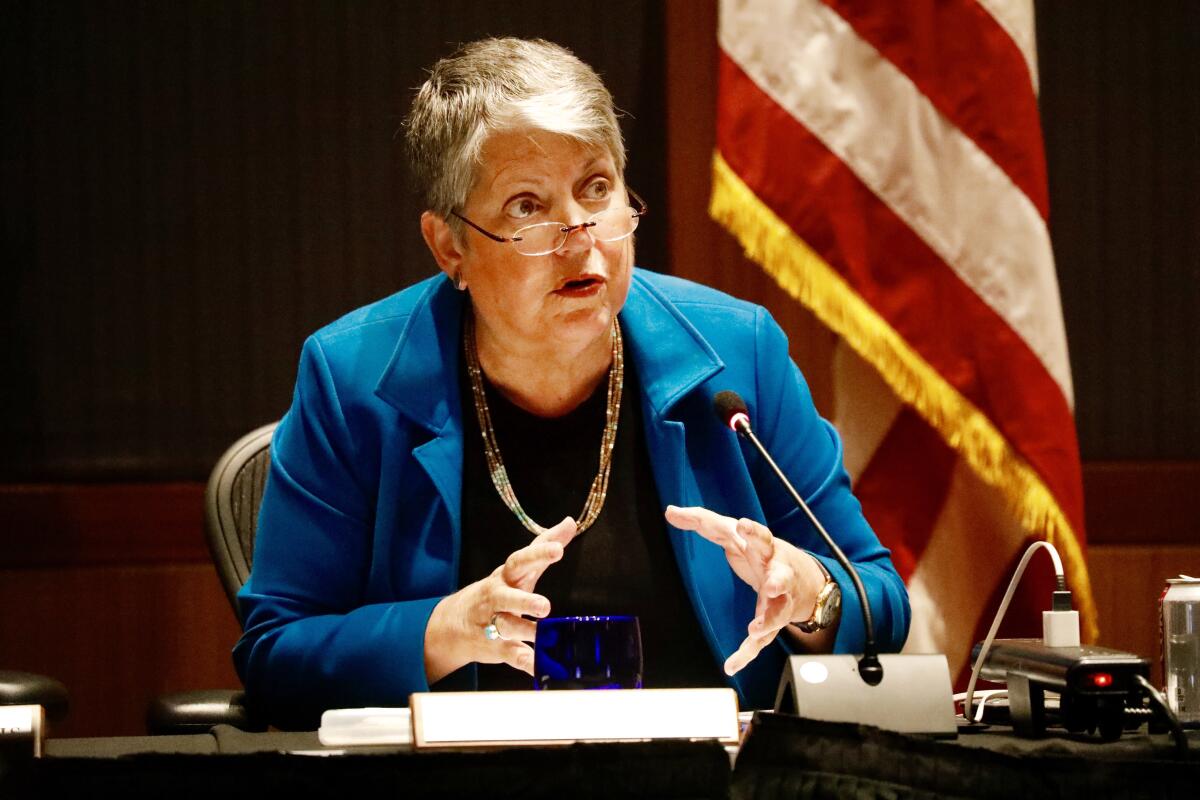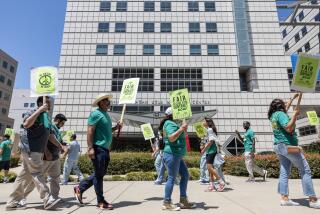UC President Janet Napolitano to step down

University of California President Janet Napolitano, who has championed immigrant students and sexual abuse victims but whose management style has sparked criticism, announced Wednesday she was resigning as head of the nation’s premier public research university system.
Napolitano made the announcement at the UC regents meeting at UCLA. She will step down Aug. 1, 2020.
“The decision was tough, and at this moment bittersweet, but the time is right,” Napolitano said. “With many new board members, with a new governor and what will be seven years of service behind me, I think the university will benefit from some fresh blood.”
Napolitano, 61, said she would join the UC Berkeley Goldman School of Public Policy to teach and write in fall 2021 after a yearlong sabbatical. She said she was not stepping down for health reasons, saying she was “completely clear” of cancer following treatment in 2016 and 2017.
UC sources said Napolitano was not forced out, although some of the regents were known to have desired a leadership change. Instead, they said, she was ready to move on.
She did not rule out running for political office, taking a Cabinet position or serving on the U.S. Supreme Court if nominated.
“You never say never and I won’t say never,” she said Wednesday.
Gov. Gavin Newsom said Napolitano “led the institution through extraordinary times, rising to every challenge that came her way, in order to maintain the excellence of our world-class public university system.”
Napolitano said she was proud of increasing enrollment of California students by more than 17,500 since 2015, supporting first-generation students and those in need of food, shelter and mental health services, and stabilizing undergraduate tuition. After her remarks, she received a standing ovation.
Napolitano became the first woman to lead the 10-campus system in September 2013. She has enrolled historic numbers of California undergraduates, aimed to increase the number of qualified community college students who transfer to UC and expanded efforts to support California high school students from all backgrounds in their pursuit of a higher education.
She took particular interest in reforming UC’s sexual harassment and sexual assault policies. She led efforts to overhaul the system with training, education and support services, such as confidential advocates for victims of sexual misconduct, after a sweeping review by a systemwide task force she launched in 2014.
UC also adopted reforms for cases involving faculty and staff. They sped up the timeline to complete investigations and decide on disciplinary measures and increased transparency in sharing the results with complainants and respondents.
Napolitano made a particular mark in expanding support for immigrant students, an accomplishment praised by Regent Eloy Ortiz Oakley. He noted that Napolitano was at first confronted with criticism by immigrant advocates when she joined UC because of her work as Homeland Security secretary overseeing then-record deportations. But in her role as university president, he said, she became a leader in immigration policies in higher education.
“It was easy to follow you … you came into this ... with a real moral authority,” he said.
One of Napolitano’s first acts as president was to meet with undocumented students and then announce, a month after she took the helm, that she would authorize $5 million in university funds to help students who entered the country illegally and do not qualify for federal financial aid. In Jan. 2015, she launched the nation’s first university efforts to provide free legal services for undocumented students and their families.
In 2017, Napolitano led UC to file a lawsuit to stop the federal government’s rescission of the Deferred Action for Childhood Arrivals program, an initiative she started as Homeland Security secretary to temporarily suspend deportations of certain young people. Injunctions granted in the case have allowed more than 500,000 DACA recipients — including members of the UC community — to renew their authorizations to live and work in the United States.
“I recognize that it is unusual for a former Cabinet official to sue the agency she once led,” she wrote. “It may be even more unusual to challenge as unconstitutional, unjust and unlawful the elimination of a program originally established by the plaintiff—me—in this litigation.”
But Napolitano hasn’t won over all undocumented students, some of whom retain hard feelings about her actions as Homeland Security secretary.
Regent Sherry Lansing, who headed the search committee that recruited Napolitano, said the president led the system with “great integrity, vision and fairness” and that it was far better off today then when she took the helm in 2013. Lansing, who heads the UC regents’ health services committee, said Napolitano’s focused attention on UC medical centers had helped them become more profitable and accessible to underserved Angelenos.
“We felt someone from the outside would bring a fresh look,” she said. “This is an extraordinary loss.”
But Napolitano also weathered several rocky moments.
During her tenure, Napolitano sparked a firestorm of criticism after a state audit found problems with her office’s financial management. UC regents agreed to carry out state auditor recommendations after revelations that UC central administrators had amassed a $175-million undisclosed surplus and paid out surprisingly large salaries. Calls for Napolitano’s resignation subsided, however, after the auditor found no “nefarious” conduct on her part.
She also was harshly criticized after her aides intervened in an audit’s effort to assess campus reaction to her office’s services.
Napolitano approved a plan instructing UC campuses to submit responses to confidential questionnaires for review by each college’s chancellor and her aides before returning them to the state auditor, according to a fact-finding report obtained by The Times. Those steps and others “constituted interference,” the investigation said.
Though Napolitano knew about the plan to review the survey responses, investigators said there was “insufficient evidence to conclude that she was aware of [the aides’] conduct in purposefully and systematically targeting unfavorable responses.”
UC regents admonished her and Napolitano apologized. The regents unanimously agreed to support her continued leadership.
“Surveygate was a really definitive moment,” said Robert May, immediate past head of the UC Academic Senate. “Her judgment as a leader was completely called into question. It was clear she had to comport herself in a completely different way.”
May and others said Napolitano took the lessons of the scandal to heart and became far more collaborative. He said she has grown to understand the UC’s unique system of shared governance with faculty—which he said was lacking when she agreed with then-Gov. Jerry Brown in May 2015 to cost-cutting changes to UC’s retirement system without consulting academic leaders. That move, he said, marked her biggest failure.
And while Napolitano was hired in part for her perceived political savvy as former Arizona governor, her relationships with key state legislators were strained.
In November 2014, Napolitano pushed a five-year, 28% tuition hike through the Board of Regents — with the proviso that it would go into effect only if the state failed to increase UC’s funding. The maneuver sparked protests, but also successfully pressured lawmakers to increase funding.
When a 2016 state audit found that UC had hurt California students by admitting too many international and out-of-state students, Napolitano came out swinging, denouncing the report as unfair and “disappointingly prebaked.” Legislators, in turn, kept the heat on her office by ordering up one audit after another and finally voting in oversight authority over her budget, which regents have criticized as a violation of the UC system’s constitutional autonomy.
In an interview Wednesday, Napolitano said the fallout over the state audits were the most challenging moments of her tenure.
“In terms of leadership style, yes, the lessons learned were to be more consultative and interactive,” she said.
Regent George Kieffer, who shepherded UC through the audit crises as Board of Regents chair, said history will show an “extraordinary record of achievement” by Napolitano as she led efforts to stabilize UC finances and launched new initiatives on climate change, protections for immigrant students, reforms of sexual misconduct policies and expansion of student access and diversity.
“She gave an enhanced profile to the university nationally,” Kieffer said.
UC Student Assn. President Varsha Sarveshwar praised Napolitano for “perseverence and resoluteness” in launching so many pro-student initiatives despite funding difficulties and said she was the first UC president to meet with students regularly.
UC Board of Regents Chairman John A. Pérez said he would appoint members of a search committee in coming days and that it would be a “consultative process” with input from students, faculty and staff from all 10 campuses about what qualities they desire in the next UC president. He praised Napolitano for her long history of public service.
Prior to taking the UC helm, Napolitano served as Arizona attorney general, then governor from 2003 to 2009 and U.S. Homeland Security secretary from 2009 to 2013 under President Obama.
Times staff writer Howard Blume contributed to this report.
More to Read
Sign up for Essential California
The most important California stories and recommendations in your inbox every morning.
You may occasionally receive promotional content from the Los Angeles Times.











